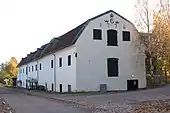
A crown distillery (Swedish: Kronobränneri) was one of the state-operated distilleries in Sweden between 1775 and 1824.
Establishment
The network of crown distilleries was established in 1775, when King Gustav III, acting on the advice of his finance minister Johan Liljencrantz, declared a state monopoly over the production and sale of alcoholic spirits, with the twofold goal of raising extra revenues for the state while also reducing alcohol consumption and its accompanying health and social problems. It therefore became illegal to obtain spirits by any means other than from the new Crown Distilleries, and as such the importation of spirits from abroad was banned, as was the distillation of spirits by private individuals.[1][2][3]
Distilleries
Some 50-60 Crown Distilleries were established across the kingdom, including the following:
Closure
The state monopoly was hugely unpopular, especially among the common people, as it banned the longstanding Swedish tradition of husbehovsbränning (roughly translatable as 'distillation for household needs'), though many people flouted the restrictions and continued to distil spirits illegally (Swedish: lönnbränning). Moreover, the Crown Distilleries themselves failed to turn a profit. Gustav III was therefore forced to lift the monopoly at the 1786 session of the Riksdag (the Swedish parliament), and most of the Crown Distilleries were shut down over the next couple of years. However, a few of the more profitable ones remained in operation for some time thereafter, and the last did not close until as late as 1824.[3][2]
See also
References
- ↑ Gustav III. Svenskt Biografiskt Lexikon. Accessed 30-12-2021
- 1 2 "Brännvin". Spritmuseum. Archived from the original on 2016-04-07. Retrieved 2016-05-26.
- 1 2 "kronobränneri". Nationalencyklopedin. Retrieved 2016-05-26.